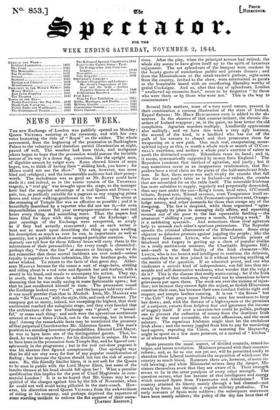Several little matters, none of a very novel nature, present
in their combination a curious illustration of the state of Ireland. Repeal flattens : Mr. Hera. HUTCHINSON even is added to the ab- sentees. In the absence of that counter-irritant, the chronic dis- orders of Ireland reappear ; or, in the quiet, we hear better the old complaints. Agrarian murders multiply. Landlordly oppressions also multiply ; and we have this week a very ugly instance, the second of the kind, in a landlord who has cut off the path of his tenants to chapel and then prosecutes them for trespassing on a new path. One such real, exasperating, mean- spirited injury as this, is worth a whole week or month of O'Cos- sztes exertions, and undoes a whole year's exertion of rulers to sooth the distracted country. Ribandism rears its head; and is, it seems, systematically supported by money from England ! The Repealers condemn that method of agitation, and justly ; but it may sometimes occur as an inopportune reminiscence, that Re- pealers have a rival claim on the purse of the half-mendicant Irish- man. In fact, there never was such rivalry for crumbs that fall from the poor man's table as in Ireland—or rather, the crumbs that are scrambled for on the table itself. The miserable Irishman has more subsidies to supply, regularly and perpetually demanded, than any race under the sun—King's taxes, local rates, O'Connell tribute, Repeal rent, Riband revenue, even Temperance itself as- sumes a shape of dunning ; with Protestant-operative rent, Orange- lodge money, and other demands for those that escape any of the foregoing. The law is despised, while these organized " agita- tions " supply its place in managing daily affairs, and squeezing revenue out of the poor to the last squeezable farthing — the uttermost "shilling a year, penny a month, farthing a week." It is a saddening spectacle. And sometimes these rival agitators help to unmask each other's spurious pretensions. The Repealer unveils the criminal allurements of the Ribandman. Some stray objector to delusion protests against juggling the people ; like the Reverend GREGORY LYNCH, who accuses Catholic priests of falsehood and forgery in getting up a show of popular dislike to a really meritorious measure, the Charitable Bequests Bill ; and—such is the fatal facility of the Irish character—Mr. LYNCH, who is too honest and intelligent to continue the delusion, confesses that he at first joined in it without knowing anything of the merits of the question. If an educated priest, and one who vindicates a certain kind of independence, can fall into that mi- serable and self-destructive weakness, what wonder that the vulger do it ? This is the disease that really wants curing ; for if the Irish were purged of that weakness, they would not be obnoxious to have grievances put upon them. The weak are ever the victims of injus- tice; not because they cannot fight the unjust, as foolish Hibernians construe their case, but because their own conduct forfeits right and respect, and tempts lawless cunning. It is not "the Saxon" but " the Celt" that preys upon Ireland; uses her weakness to keep her down ; and, with the threats of a highwayman or the promises of a conjuror, extorts from helpless fear and ignorance the income of beggary itself. If ever a coercion-law could be politic, perhaps one to prevent the collection of money from the destitute Irish would be the most excusable, the most efficacious, and the most salutary. The rapacious Irishman might then let the credulous Irish alone ; and the money juggled from him to pay for murdering land-agents, repealing the Union, or restoring the Heptarehy, might be spent on a few more potatoes, or a morsel of " kitchen" or of wheaten bread.


























